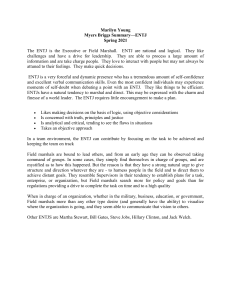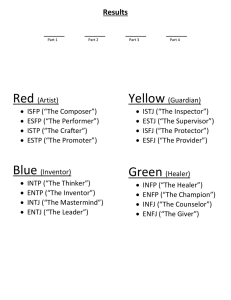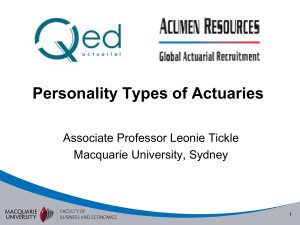M-B Temperament 2014 RO Mid-Year
advertisement
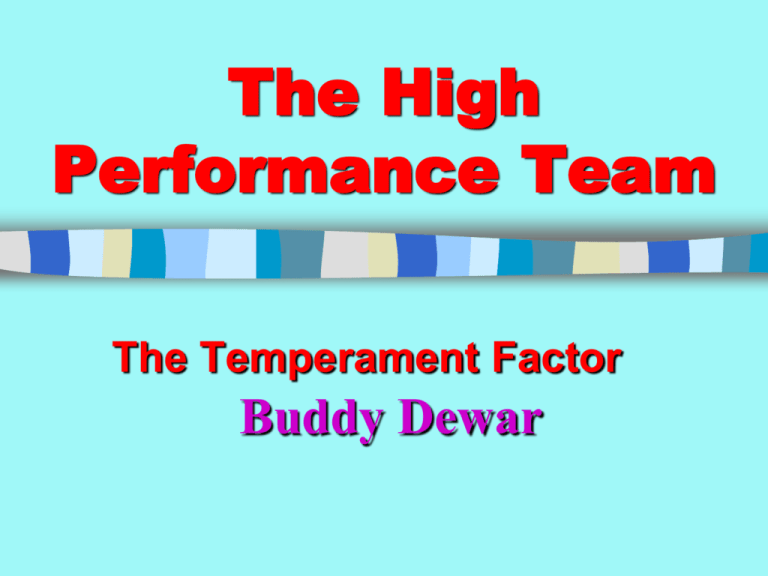
The High Performance Team The Temperament Factor Buddy Dewar The Value of Understanding Teams Understand why some team members lack trust. Understand why some team members are intimidated by others. Understand why breakdown in communications occur. The Value of Understanding Teams Understand why some team members seek too much control. Understand why some team members do not listen. Understand why breakdown in planning results occur. A Team’s Collective Functional Behavior 1. Team members communicate with one another. 2. Team members filter information. 3. Team members make judgement. 4. Team members reach closure by making decisions. Team members Come to the meeting and function with four pairs of preferences Team Functional Preferences II - Introversion E - Extroversion S - Sensation Communications Filter Information N - Intuitive T - Thinking F - Feeling P - Perceiving J - Judging Make Judgements Reach Decisions Characteristics Of Team Member Preference Introversion I – Territorial – Concentration – Limited Relationships – Internal Events Extroversion E – Sociability – Interaction – Multiplicity of Relationships – External Events Characteristics Of Team Member Preference Sensing S – Sensible – Practical – Experience – Actual – Realistic Intuitive N – Imaginative – Ingenious – Hunches – Possible – Speculative Characteristics Of Team Member Preference Thinking T – Objective – Policy – Laws – Impersonal – Justice Feeling F – Subjective – Social Values – Extenuating Circumstances – Personal – Humane Characteristics Of Team Member Preference Judging J – Settled – Decided – Fixed – Planned – Closure Perceiving P – Pending – Gather More Facts – Flexible – Open-ended – Open Options ENTJ “Field Marshal” ENTJ Traits: –Always wants to lead. –Strong urge to give structure. –Quick to find solution - not all solutions well thought out. –Greatly impatient with inefficiency. Field Marshals. ar y er Napoleon Bonaparte Julius Caesar George C. Marshall Golda Meir Carl Sagan Edward Teller Margaret Thatcher Buddy Dewar Eric Gleason Suzanne Mayr Holly Garvey ENTJ Approximately 3-5 percent of the population But 25% of NFSA RO INTJ “Mastermind” INTJ Traits – Enjoys theoretical and abstract concepts – Likes to build the castle – Perfectionist with high expectations – Good at designing systems – Focused on the future – Enjoys solitary work, most independent of all types Mastermind Ben Bernanke Dwight D. Eisenhower Bill Gates Ulysses S. Grant Stephen Hawking Isaac Newton Ayn Rand Ray Lonabaugh Approximately 2.1 percent of the population are INTJs ENFJ – “Teachers” Teachers are introspective, directive, cooperative, and expressive. They tend to look for the best and to expect it from those around them. Teachers communicate a belief that everyone has the potential to succeed. They may motivate others to meet the Teacher's positive expectations. Teachers may unintentionally overpower others with their idealized vision. ENFJ “Teachers” Mikhail Gorbachev Pope John Paul II Margaret Mead Ralph Nader Oprah Winfrey John Wooden Bob Tinucci Lorrell Bush Wayne Waggoner Approximately 2-5 percent of the population are ENFJs ESFJ “Provider” Providers are observant, cooperative, informative, and expressive. They are greatly concerned with the health and welfare of those under their care. Providers are the most sociable of the Guardians and they strive to provide friendly social service. They spend a lot of their energy making sure social functions are successful, traditions are upheld, and the needs of others are met. ESFJ “Provider” Dolly Madison James Cash (J.C.) Penny William Howard Taft David Thomas Barbara Walters Sam Walton Bruce Lecair Approximately 9-13 percent of the population are ESFJs ISTP “Crafters” Crafters are tactical operators, concrete in speech and utilitarian in action. Crafters are masters at using tools of every type—artistic, technological, martial. Although they are introverts, they are authoritarian in their interactions with others and forceful at influencing people. They focus on accomplishing tasks efficiently and skillfully. To master the tool of their interest, Crafters require a certain degree of seclusion in which to practice. ISTP “Crafters” Woody Allen Tiger Woods Alan Shepard Michael Jordan Katharine Hepburn Michael Douglas Chris Gaut Approximately 4-6 percent of the population are ISTPs ESFP “Performer” Performers are tactical entertainers, concrete in speech and utilitarian in action. The most fun-loving of all the types, Performers excel at delighting others with their artistry and humor. They continually seek stimulating experiences with those around them. Incurable optimists, they are generous to a fault. ESFP “Performer” Bill Clinton Ronald Reagan Leonard Bernstein Magic Johnson Elvis Presley Elizabeth Taylor Cindy Giedraitis Approximately 4-9 percent of the population are ESFPs ESTJ “Supervisor” Supervisor are civic-minded individuals who dedicate themselves to the mission. They often rise to positions of leadership in service organizations and in their careers. Supervisors are strong believers in rules and procedures, and they prefer tried methods to experimental ones. With their outgoing nature, Supervisors are quick to communicate their opinions and expectations to others. They are hard-working, and they take their obligations seriously. ESTJ “Supervisor” George Washington Sandra Day O’Connor Vince Lombardi Mike Wallace Judith Sheindlin Dan Gengler Tom Brace Approximately 8-12 percent of the population are ESTJs ISTJ “Inspector” Inspectors are careful and thorough in examining people and institutions. Comprising about 6 to 10 percent of the population, Inspectors are decisive in practical affairs. Inspectors are people of their word, intent on preserving social and family values. Inspectors reliably examine the people and products that fall under their tutelage—unobtrusively ensuring uniform quality and demanding that certain standards of conduct are maintained. In both their professional and personal lives, individuals of this type are rather quiet and serious. Inspectors are extraordinarily persevering and dependable. ISTJ “Inspector” Queen Elizabeth Harry S. Truman Warren Buffet Queen Victoria John D. Rockefeller David Lafond Ron Brown Approximately 11-14 percent of the population are ISTJs ENFP “Champion” Champions are introspective, cooperative, informative, and expressive. Champions have a strong desire to make their thoughts known to the world. Champions are greatly concerned with ethics and justice and have a strong desire to speak about current issues and events. Champions are keen observers of the people around them. Champions are warm, energetic, spontaneous, positive, exuberant and dramatic. ENFP “Champion” Joan Baez Charles Dickens Phil Donahue Martin Luther King Sargent Shriver Dom Kasmauskas Approximately 6-8 percent of the population are ENFPs Best Team Temperament Diverse mixture of various temperaments. Need Balance in all four temperament preferences Creating Temperament Balance E=12 N=9 T=10 J=13 I=4 S=7 F=6 P=3 Team Will Adopt ENTJ Traits Diversity? Composite Score X 10 E=120 I=40 X 20 S=180 N=140 X 20 T=200 F=120 X 20 J=260 P=60 Team Composite Score Score Above 65 Between 40-64 Below 40 Actions You are on solid ground There are some weaknesses that should be addressed. Teams will have difficulty taking hold. Revisit team composition. The Great Boat Race Hawk’s Cay, Florida The Manager Types Matrix SP ISTP ESTP ISFP ESFP SJ ISFJ ESFJ ISTJ ESTJ NT INTP ENTP INTJ ENTJ NF INFJ ENFJ INFP ENFP SP - The Troubleshooter Manager Cleaver, graceful, flair, brave, bold. Manger Strengths – Practical in every sense of the word. – Easily adapts to new situations. – Can observe organizational systems and determine overall effectiveness. – Knows what is going on in the organizational unit. – Deals with concrete organizational problems in an expeditious manner. SP - The Troubleshooter Manager Weaknesses: – Ignores theory. – will resist change created by others. – Doesn’t like the unfamiliar. – Lives for the “immediate moment.” – Forgets past commitments. – Unpredictable to subordinates. – Becomes rigid when not troubleshooting. SJ - The Traditionalist Manager Responsible, Thorough, loyal, industrious and cautious. Manager Strengths – A stabilizer and consolidator. – Focus on organization as a nourishing body. – Draws up lines of communication. – Establishes rules and schedules. – Expects things to be clear and settled. SJ - The Traditionalist Manager Manager Weaknesses: – Resists change - difficult with paradigm shifts. – Impatient with delayed projects. – Doesn’t notice required new things. – May not examine procedures. – Inclined to keep ineffective processes. – Sees some people as good, and some people as bad. NT - The Visionary Manager Ideas, Concepts, Change, Emerging trends. Manager Strengths: – Works well with changing environment. – Interested in the principles of an organization. – Capable of seeing the dimensions of systems. – Sees the need for an organizational system. – Focuses on creativity of staff. – Has awareness of behaviors that staff displays. NT - The Visionary Manager Manager Weaknesses: – Once the “castle is built” the NT loses interest. – Intellectually-oriented and may unknowingly communicate, an attitude, of not valuing employees. – Expects too much from self and others. – At loss for small-talk in social situations. – Blames self when plans are not carried out. NF - The Catalyst Manager Personable, Unique, Idealist, employee-oriented. Manager Strengths: – Possesses personable charisma and commitment to the employee. – Allows contributions by all members of the work team. – Can turn liabilities into assets in people problems. – Sees the positive side of people and events. NF - The Catalyst Manager Manager Weaknesses: – Poor with time management. – Loses self-confidence if an idea is criticized. – Torn between needs of subordinates and requests from superiors. – Never schedules time for one’s self. – Makes administrative decisions based on personal likes and dislikes. – Wishes to please everyone. Questions?

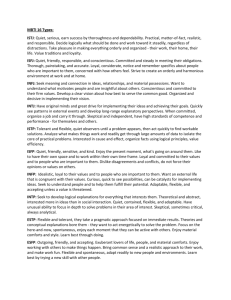


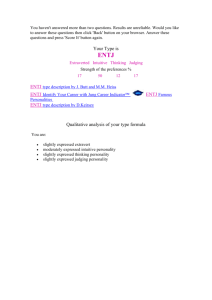
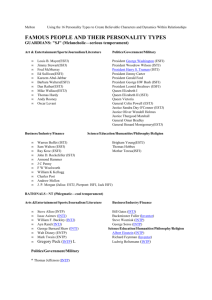
![Transformational Change [Powerpoint Presentation]](http://s2.studylib.net/store/data/005447411_1-da0a83bd34bdb90183940ab700125003-300x300.png)
